#I want Good Omens to mean something more than just a romance show
Text
Okay this may be my hottest take ever but I… bear with me… dislike how popular Ineffable Husbands is. Let me explain. Good Omens has been an incredibly important book for me since the first time I opened it at 11 years old. It’s shaped everything from my writing style to my views on society and the world. It’s safe to say I’ve read this book 8 times at least.
Season 1, also very dear to me. I loved seeing these characters on screen and although some parts were different or cut, everyone worked so hard in their roles that it brought the book to life.
Now, here’s where I get lost. Good Omens is a story about the end of the world, and while yes its “main” characters are an angel and a demon who are very fond of the world and each other, the simple fact is that they aren’t what’s important about the story. They are fun and deep and amazing characters, but so are The Them, and Anathema and Newt, and Agnes Nutter, and Shadwell and Madam Tracy, and Warlock, and the four horsemen (and other four horsemen)/ bikers of the apocalypse, and that one televangelist that lives rent free in my head, and that guy who sees the trees take over the city and R. P. Tyler and everyone else.
They make the story. They are the humans— sans the four bikers—, and this gets lost in the fandom and, dare I say it, season two. I will say right now that I adore season 2, it’s what I’ve waited 4 years for and I would never ever criticize Neil Gaiman as I am definitely not qualified enough for that.
But.
Season 2 makes it all about Aziraphale and Crowley. It loses the message of the book and becomes almost a sort of rom com (for all our yelling and heartbreak and accusations of liar, Neil was right. It is quiet, gentle, and romantic). This is not inherently bad at all, but to me, it’s not Good Omens. It’s not the same. Crowley and Aziraphale were never my favorites, they were never where the meat of the story is at, so that’s where my point comes from I guess.
I am so glad we have representation like them. Middle aged queer people who have god knows what gender fuckery going on. But, sometimes I wish we talked about anything other than them. I wish I could find thoughtful analysis and writing and art just about the book (and even the show) that wasn’t simply “Crowley and Azirapahle aren’t together and they’re sad but then they are and now they’re happy.”
I don’t want anyone to read this and think I don’t like the ship, I love it, it was my first ship. But, sometimes, I just wish Good Omens hadn’t turned into a romance. I wish it was still the delightfully funny and childishly dark story that made me think, for the first time, writing was something I wanted to do. Because it was more than just a story, it was an idea.
TLDR: I love Ineffable Husbands, but I wish the fandom could talk about literally anything else for a change
#good omens#good omens season 2#good omens meta#maybe#this is probably controversial#Crowley#aziraphale#I know I’m just being picky#but I want more than just our favorite angel and demon#I want Good Omens to mean something more than just a romance show#ineffable husbands#hopefully this doesn’t upset anyone#and makes sense#I just needed to get my thoughts out there#and if anyone finds this with the same ideas as me#please direct me to the corner of the internet where you came from#I’m not reading this again so if there’s spelling mistakes no there’s not
35 notes
·
View notes
Text
From AnaMaria Abramovic on Fb
Paste magazine has done an article about Michael and how underrated he is in Good Omens and I found a transcript since it's behind a paywall. Here's the link if anyone wants to subscribe. 💙
https://www.pastemagazine.com/tv/amazon-prime-video/good-omens-michael-sheen-underrated-performance-explained-streaming
There’s so much to love about Prime Video’s Good Omens. A delightful adaptation of the popular Neil Gaiman and Terry Pratchett novel of the same name, the series is romantic, thoughtful, hilarious, and heartfelt by turns. The story of the almost-apocalypse and what comes afterward, it wrestles with big concepts like destiny, free will, and forgiveness, all framed through the lens of an unorthodox relationship between an angel and a demon whose love for one another is a key to saving the world.
As anyone who has watched Good Omens already knows, nothing about this series works without the pair of lead performances at its center. Stars David Tennant and Michael Sheen—who play the demon Crowley and the angel Aziraphale, respectively—have the kind of lighting-in-a-bottle chemistry that’s the stuff of legend, and their characters’ every interaction conveys both their deep affection for one another and the Earth they’ve made their home. Their romance is the emotional linchpin around which most of the series turns, and their heartbreaking separation in the Season 2 finale is so devastating precisely because we’ve seen how necessary the two are to each other’s lives.
But it’s Sheen’s performance in that final scene that really twists the knife. As Aziraphale’s face crumples following his and Crowley’s long-awaited kiss, the actor manages to convey what feels like every possible human emotion in the span of less than thirty seconds as the angel realizes what he has both had and just lost. The moment is emotionally brutal to watch, particularly after sitting through five and a half episodes of Aziraphale looking as lovestruck as the lead in any rom-com. Sheen makes it all look effortless, shifting from giddy joy to devastated longing and everything in between, and we really don’t talk enough about how powerful and underrated his work in this series truly is.
Though he’s half of the central duo that makes Good Omens tick, Sheen’s role often tends to get overshadowed by his co-star’s. It’s not difficult to see why, given that Tennant gets to spend most of the show swanning around in tight trousers looking like the Platonic ideal of the charming bad boy, complete with flaming red hair and dramatic eyewear. Tennant also benefits from Crowley’s much more sympathetic emotional arc. I mean, it’s hard not to love a cynical demon with a heart of gold who’s been pining after his angelic best friend for literal millennia even after being cast out from Heaven. Of course, viewers are drawn to that—likely a lot more easily than the story of an angel who’s simply trying the best he can to do the right thing as he wrestles with his role in God’s Ineffable Plan. Plus, let’s be real, Tennant’s sizeable Doctor Who fanbase certainly doesn’t hurt his character’s popularity.
As a performer, Sheen has a long history of playing both real people (Tony Blair, David Frost, Brian Clough) and offbeat villains (Prodigal Son’s Martin Whitly, Underworld’s Lucian, the Twilight Saga’s Aro). In some ways, the role of a fussy, bookish angel is playing more than a bit against type for him—Gaiman himself has said he originally intended for Sheen to be Crowley—but in his capable hands, Aziraphale becomes something much more than a simple avatar for the forces of Good (or even of God, for that matter). With a soft demeanor and a positively blinding smile, Sheen’s take on the character consistently radiates warmth and goodness, even as it contains surprisingly hidden depths. The former guardian of the Eastern Gate of Eden who gifted a fleeing Adam and Eve his flaming sword and befriended the Serpent who caused their Fall, Azirphale isn’t a particularly conventional angel. He enjoys all-too-human indulgences like food and wine, runs a Hoarders-esque bookshop that never seems to sell anything, and spends most of his time making heart eyes at the being that’s meant to be his hereditary adversary.
Given the much more difficult task of playing the literal angel to Tennant’s charming devil, Sheen must find a way to make ideas like goodness and forgiveness as interesting and fun to watch as their darker counterparts. It’s a generally thankless task, but one that Sheen tackles with gusto, particularly in the series’ second season, as Good Omens explores Aziraphale’s slowly evolving idea of what he can and cannot accept in terms of being a soldier of Heaven. His growing understanding that the truth of creation is colored in shades of grey and compromise is often conveyed through little more than Sheen’s deftly shifting expressions and body language.
Our pop culture consistently struggles to portray the idea of goodness as something compelling or worth watching. Explicitly “good” characters, particularly those who are religiously coded, are frequently treated as the butt of some sort of unspoken joke they aren’t in on, used to underline the idea that faith is a form of naivety or that kindness is somehow a weakness. For a lot of people, the entire concept of turning the other cheek is a sucker’s bet, and believing in something greater than oneself, be it a higher power or a sense of purpose, is a waste of time. But Good Omens is a story grounded in the idea that faith, hope, and love—for one another, God, and the entire world—are active verbs. And nowhere is that more apparent than in Sheen’s characterization of the soft angel whose old-fashioned waistcoats mask a spine of steel and who refuses to give up—on Crowley, on humanity, or on the idea that Heaven is still something that can be saved.
Though he and Tennant have pretty much become a matched set at this point (both on and off-screen), Sheen’s performance has rarely gotten the critical accolades it deserves. (Tennant alone was nominated for a BAFTA for Season 2, and Sheen was categorized as a supporting actor when the series’ competed in the 2019 Saturn Awards.) But it is his quiet strength that holds up so much of the rest of the show around him, and Sheen deserves to be more frequently recognized for it. That he makes it look so easy is just another sign of how good his performance really is.
268 notes
·
View notes
Text
The Crow Road by Iain Banks
I finished The Crow Road and had a little time to think about it. I'll put my thoughts under a Keep Reading in case anyone is trying to avoid spoilers.
As I speculated before, I think it's likely that The Crow Road is more related to Good Omens in philosophy than in plot. I mean, it's not that the plots necessarily have nothing in common, and we could be very surprised in the end of course, but now that I've read the whole book, its philosophical commonalities with GO are both apparent and kind of inspiring. Also, if I were a writer, I'd be more interested in dropping hints about what themes are important than telegraphing my whole plot ahead of time.
So here, I will describe the book and point out themes that I believe may reappear in Good Omens 3.
This is a long post. If you read it, make a cup of [beverage of choice].
Update on 4/20/2024: I made a second post: The Crow Road and Good Omens: Further-Out Thoughts
Below are mentions of suicide, death/murder, and sexual acts.
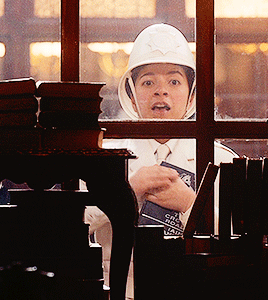
The Crow Road centers around a character named Prentice McHoan, a university student in Scotland who starts to sort out his complicated relationship with his complicated family as he explores the mystery of his uncle Rory's disappearance. Although the book is mostly from Prentice's perspective, the narration jumps around in time with the McHoan family. There are quite a lot of important characters to keep track of; the bare-bones summary I put below doesn't even include some of the important ones. I wanted to make the summary even shorter and simpler than this, but the truth is that this book is not short or simple, and if I made the summary any simpler, it might be downright misleading.
There are at least three major cultural aspects of The Crow Road that I am inexperienced with: the overall culture in the 1950s-1980s (I was born in 1988, so of course wasn't here for the relevant decades), the international experience of the Gulf War (again, born in 1988), and the history and culture of Scotland itself (I'm USAmerican with only reading as a source). As a result, I'm sure there are important dimensions to the book that I've missed. If someone has a different perspective taking some of these things into account, I'd love to know about it.
Also, keep in mind, there is a great deal of descriptive writing in this book. There are a lot of pages about the geography of Scotland, and about Prentice as a kid, and about Prentice's father and uncles hanging out together in their youth, and about various family incidents, and about Prentice spending time with his brothers and friends. At first, these passages seem to just make things more confusing, and in my head, I accused them of being "filler." But they definitely serve a purpose. They're a way of showing and not telling the characters' attitudes and relationships to each other. More importantly, because we get to actually live these experiences with the characters, they are what give all the plot points below their deeper emotional impacts. In other words, the everyday experiences give the plot its deeper meaning. They resonate with one of the core themes in the novel: that our experiences in life, rather than any supposed existence after death, are what matters.
The Crow Road's story is like this:
Prentice is rather directionless in life, and he seems to have trouble investing any energy in his own future as he moons over his unrequited feelings for an idealized young woman named Verity. Soon, Verity ends up in a romance with Prentice's brother, Lewis, and Prentice feels that Lewis "stole" her from him. Prentice has also become estranged from his father, Kenneth, over spirituality. Prentice believes there has to be something more after death because he feels it would be incredibly unfair if people didn't get anything other than this one life; Kenneth is not only a passionate atheist, but is offended by the notion of an afterlife.
Prentice's uncle Hamish, Kenneth's brother, has always been religious, although his religion involves a number of bizarre and offbeat ideas of his own, with inspiration from more traditional Christian notions. Prentice is not really sure about this ideology, but he's willing to talk to Hamish about it and even participates during Hamish's prayers, whereas Kenneth is openly scornful of Hamish's beliefs. Hamish interprets this as Prentice being on "his side."
Prentice has a few opportunities to go back and talk to his father, and is begged to do so by his mom, Mary, with whom his relationship is still good. Mary doesn't want either of the men to give up their inner ideas about the universe; she just wants them to agree to disagree and move on as a family. Prentice says he will visit, but he just keeps putting it off and off and off.
Prentice acquires a folder containing some of his missing uncle Rory's notes in the process of hooking up with Rory's former girlfriend, Janice Rae, who seems to have taken a shine to Prentice because he reminds her of Rory. Using the contents of the folder, Prentice wants to piece together the great literary work that Rory left unfinished, which Rory titled Crow Road; however, it becomes apparent that Rory didn't turn his concepts into anything substantial and only had a bunch of disconnected notes and ideas. He hadn't even decided whether Crow Road would be a novel, a play, or something else. The few bits of Rory's poetry for Crow Road read are bleak and depressing.
Prentice also spends a lot of time with a young woman named Ash. They've been good friends since childhood and seem to have a somewhat flirtatious dynamic now, but they aren't in a romantic relationship; mostly, they drink and hang out together. Ash tells Prentice bluntly to get his life back on track when she finds out he's failing at school, avoiding his family, and engaging in shoplifting. She is a voice of reason, and when Prentice insists to her that he's just a failure, she reminds him that actually, he's just a kid.
Prentice's efforts to figure out Rory's story or location stagnate, and he continues to fail at school and avoid his father. He then receives word that Kenneth was killed while debating faith with Hamish. In fact, Kenneth dies after a fall from a church lightning rod, which he was climbing in an act of defiance against Hamish's philosophy when it was struck by lightning; Hamish is convinced that Kenneth had incurred God's wrath. Ash is there for support when Prentice finds out about the death.
With Ash's help, Prentice returns to his hometown again to help manage Kenneth's affairs. Prentice speaks with a very shaken Hamish, who is handling Kenneth's death with extreme drama and making it all about his own feelings. Hamish tells Prentice that Kenneth was jealous that Prentice shared more in common with Hamish's faith than with Kenneth's lack of faith. However, this isn't really true, and as he contemplates his father's death, Prentice begins to internalize one of the last things Hamish reported that Kenneth had argued: "All the gods are false. Faith itself is idolatry."
As the chapters go on, Prentice is compelled by some of the meaningful items related to Rory that he discovers in his father's belongings. He gains a renewed sense of purpose trying to solve the mystery of where Rory went and what happened to him. Among the interesting items are an ancient computer disk of Rory's that Prentice can't access with any equipment he can find; Ash uses her connections in the US and Canada to find a computer expert who can finally open the files on it. This takes quite a while, since the disk has to be mailed and Ash's connection is investigating the disk only in his free time.
Prentice also discovers that his feelings for Verity have changed. He no longer feels angry with Lewis for "stealing her." At first, Prentice's narration describes this as his feelings "cooling" as a result of the trauma of losing his father, but interestingly, this soon means Prentice gets to know Verity as a sister-in-law without getting caught up in jealous romantic feelings. Verity gets along well with the family, and Prentice is actually happy to discover that she and Lewis have a baby on the way. Prentice's relationship with Lewis improves greatly as well, partly because he is no longer jealous and partly because he realizes he does not want to lose Lewis, too.
Ash's connection who was looking at Rory's computer disk comes through and sends the printed contents of the files to Prentice. The files reveal to him that Rory likely knew Prentice's uncle, Fergus, murdered his wife by unbuckling her seat belt and crashing their car. Rory had written out a fictional version of events and considered using it in Crow Road. I'm not clear on exactly how certain Rory was about Fergus's crime, or whether Rory would have intentionally reported Ferg, or whether Rory even had enough proof to publicly accuse Ferg of murder, but people would likely have connected the dots in Rory's work and become suspicious of Ferg. For this reason, Prentice believes Ferg murdered Rory as well.
Prentice confronts Ferg. He doesn't get a confession and leaves Ferg's home with no concrete proof of anything; Ferg denies it all. But Prentice is soon physically assaulted in the night, and it seems Ferg was almost certainly the culprit, because he hadn't been home that same night, and he had injuries (probably from being fought off) the next day. A day or two later, Ferg's body is found unconscious in the cockpit of a plane, which crashes into the ocean. It's uncertain whether this was a suicide, but Prentice suspects it was. Rory's body is then soon recovered from the bottom of a waterway near Prentice's home, where Ferg had sunk it years ago.
As the mysteries are solved, Prentice realizes his feelings for Ash are romantic love. However, it's too late, he thinks, because Ash is about to take a job in Canada, where she may or may not stay. Prentice also hesitates to approach her because he's embarrassed about his previous behavior, venting all his angst about Verity and his father. He isn't sure she would even want to be in a relationship with him after that. But the very night before Ash leaves, she kisses Prentice on the cheek, which leads to a deeper kiss. They finally connect, have sex, and confess their mutual feelings. Ash still goes to her job in Canada, but says she'll come back when Prentice is done with his studies that summer.
The relationship's future is somewhat uncertain because something could come up while Ash is in Canada, but Prentice is hopeful. The book ends with Prentice getting ready to graduate with his grades on track as a history scholar, fully renouncing his belief in an afterlife while he acknowledges the inherent importance of our experiences in our lives now, and enjoying his time with Lewis and Verity and his other family members.
What's the point of all these hundreds of pages?
Well, look at all of the above; there's definitely more than one point. But the main point I took away is that we get this one life, with our loved ones in this world here and now, and this is where we make our meanings. There is no other meaning, but that doesn't mean there's no meaning at all. It means the meaning is here.
It's not death that gives life its meaning. It's the things we do while alive that give life its deeper meaning.
The Crow Road is described (on Wikipedia) as a Bildungsroman, a story focusing on the moral and philosophical growth and change of its main character as they transition from childhood to adulthood ("coming-of-age novel" is a similar term that is interchangeable, but more vague and not necessarily focused on morality/philosophy). And, indeed, all of the plots ultimately tie into Prentice's changed philosophy.
After his argument with Kenneth, Prentice feels childish and humiliated, and as a result, he refuses to go back home, which leads to a spiral of shame and depression. Kenneth dies and Prentice realizes it's too late to repair the relationship, which also leads him to realize it's what we do in life that matters, and that therefore, his father's argument was correct after all.
At the end of the novel, Prentice outright describes his new philosophy. However, I can't recall one specific passage where Prentice describes the process of how he changed his mind (if anyone else can remember something I missed, do let me know). There is, however, a moment when his narration indicates that Hamish seems less disturbed by his own part in the incident that led to Kenneth's death and more disturbed by the notion that his beliefs might actually be true: there might actually be an angry, vengeful God. In other words, Hamish's philosophy is selfish at its core.
My interpretation is that when his father died, Prentice realized three things: how utterly self-serving Hamish's devout faith is, how Kenneth's untimely death proves the importance of working things out now rather than in an imaginary afterlife, and how much profound meaning Kenneth had left behind despite having no faith at all. After these realizations, a determined belief in an afterlife no longer makes our lives here more profound like Prentice once thought it did.
Also, it's worth noting that this incident changes Prentice's idea of partnership, too. He loses interest in this distant, idealized woman he's been after. In love as in the rest of life, Prentice lets go of his ideals, and in doing so, he makes room for true meaning, both in a sincere familial, platonic connection with Verity and a sincere intimate, romantic connection with Ash.
But what about the sex scene?!
Yes, indeed, at the tail end of the story, Prentice and Ash have sex and admit they want to be in a relationship together. Prentice's narration describes them sleeping together and having intercourse not just once, but many times, including some slow and relaxed couplings during which they flex the muscles in their private parts to spell out "I.L.Y." and "I.L.Y.T." to each other in Morse code. This is relevant because earlier, they had been surprised and delighted to discover that they both knew Morse code; it isn't a detail that came from nowhere.
I didn't get the impression that this scene was trying to be especially titillating to the reader. It was mostly just a list of stuff the characters did together. I felt the point was that they were still anxious about being emotionally honest, a little desperate to convey their feelings without having to speak them out loud, and awkward in a way that made it obvious that their primary concern was the feelings, not the sexual performance. They cared about each other, but they weren't trying to be impressive or put on a show; contrast this with previous scenes where Prentice would act like a clown in front of Ash to diffuse his own anxiety. I've always thought that being able to have awkward sex and still enjoy it is a good sign.
Okay, so what does this all have to do with Good Omens?
Here's where I have to get especially interpretive. I'm doing my best, but of course, not everyone reading this will have the same perspective on Good Omens, the Final Fifteen especially. I believe similar themes are going to resonate between The Crow Road and Good Omens regardless of our particular interpretations of the characters' behavior and motivations, but I suppose it could hit differently for some people.
The TL;DR: I see similar themes between The Crow Road and Good Omens in:
The importance of mortal life on Earth
Meaning (or purpose) as something that we create as we live, not something that is handed to us by a supreme being
Sincere connection and love/passion (for people, causes, arts, life's work, etc) as a type of meaning/purpose
Relationships as reflections of philosophy
The dual nature of humanity
Life on Earth as the important part of existence is a core theme in Good Omens, and has been since the very beginning. We all already know Adam chose to preserve the world as it already is because he figured this out, and we all already know Aziraphale and Crowley have been shaped for the better by their experiences on Earth. But Good Omens isn't done with this theme by a long shot. I think this is the most important thematic commonality Good Omens will have with The Crow Road. Closely related is the notion that we create our meanings as we live, rather than having them handed to us. Isn't this, in a way, what Aziraphale struggles with in A Companion to Owls? He's been given this meaning, this identity, that doesn't fit him. But does he have anything else to be? Not yet.
Partnerships as a parallel to the characters' philosophical development also resonates as a commonality that The Crow Road may have with Good Omens. Prentice's obsession with Verity goes away when he starts to embrace the importance of life on Earth and makes room for his sincere relationship with Ash. Note their names: "Verity" is truth, an ideal Prentice's father instills in him; "Ashley" means "dweller in the ash tree meadow" in Anglo-Saxon, according to Wikipedia, and "ash" is one of the things people return to after death. Prentice literally trades his high ideals for life on Earth. We see in Aziraphale a similar tug-o'-war between Heaven's distant ideals and Crowley's Earthly pleasures, so I can see a similar process potentially playing out for him.
I don't particularly recall a ton of thematic exploration of free will in The Crow Road. However, there is a glimmer of something there: Prentice feels excessively controlled by Kenneth's desire to pass down his beliefs, and part of the reason Prentice is so resistant to change is simply his frustration with feeling censored and not being taken seriously. As the reader, I do get the feeling that while Prentice is immature, Kenneth made major mistakes in handling their conflict, too. And Kenneth's mistakes come from trying to dictate Prentice's thoughts. There is likely some crossover with Good Omens in the sense that I'm pretty sure both stories are going to take the position that people need to be allowed to make mistakes, and to do things that one perceives as mistakes, without getting written off as "stupid" or "bad" or otherwise "unworthy."
Suffice it to say that the human characters in Good Omens will also certainly play into these themes, but it's hard to write about them when we don't know much about them except that one of them is almost certainly the reincarnation of Jesus. This also makes me suspect perhaps the human cast will be 100% entirely all-new, or mostly new, symbolic of how Aziraphale and Crowley have immersed themselves in the ever-evolving, ever-changing world of life on Earth. Alternatively, if we encounter human characters again from Season 1 or 2, perhaps the ways they've grown and changed will be highlighted. For example, even in real-world time, Adam and Warlock have already, as of the time I'm writing this, gone through at least one entire life stage (from 11 in 2019 to 16 in 2024). They'll be legal adults in a couple of years, and if there's a significant time skip, they could be much older. If characters from Season 1 do reappear and themes from The Crow Road are prominent, I would expect either some key scenes highlighting contrasts and changes from their younger selves or for stagnation and growth to be a central part of their plot.
The more I write, the more I just interpret everything in circles. Hopefully this post has at least given you a decent idea of what The Crow Road is like and how it may relate to Good Omens.
I'll end this post with a quotation that feels relevant:
Telling us straight or through his stories, my father taught us that there was, generally, a fire at the core of things, and that change was the only constant, and that we – like everybody else – were both the most important people in the universe, and utterly without significance, depending, and that individuals mattered before their institutions, and that people were people, much the same everywhere, and when they appeared to do things that were stupid or evil, often you hadn’t been told the whole story, but that sometimes people did behave badly, usually because some idea had taken hold of them and given them an excuse to regard other people as expendable (or bad), and that was part of who we were too, as a species, and it wasn’t always possible to know that you were right and they were wrong, but the important thing was to keep trying to find out, and always to face the truth. Because truth mattered.
Iain Banks, The Crow Road
#good omens#the crow road#good omens book club#go3 speculation#s3 speculation#good omens 2 spoilers#go s2 spoilers
158 notes
·
View notes
Text
Holy Kittens, Y'all: My Favorite Good Omens Moment Has Gotten EVEN MORE ROMANTIC
Okay so I wrote this post about my favorite moment in Good Omens, and the stuff people are pointing out in the reblogs and comments is blowing my freaking mind, and I HAVE to show you how beautifully this all fits together, like I am flailing at my desk about this.
@vidavalor points out this gif from @soft-ange-aziraphale [Source]:
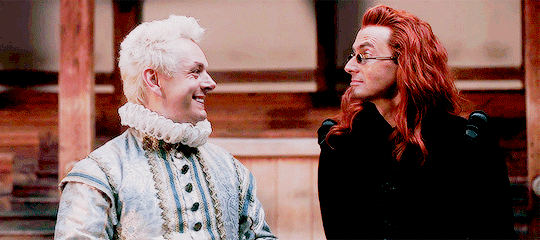
Here it is in sequence (gifs 1-4 from Fuck Yeah Good Omens):
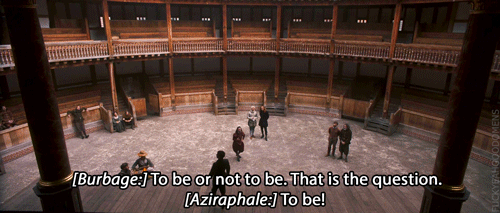
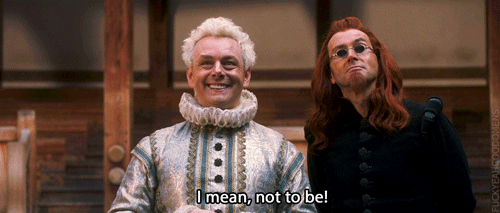
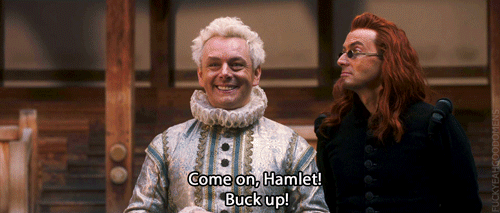

I can't stop laughing over Aziraphale's smile, which shows, as @quoththemaiden says, that he's "utterly delighted with himself" and knows perfectly well that he's minxing Crowley; and this tiny extension of the moment convinces me even more that Crowley is desperately fighting a smile himself here.
Actually there's a lot in @quoththemaiden's comment that's insightful and well-put:
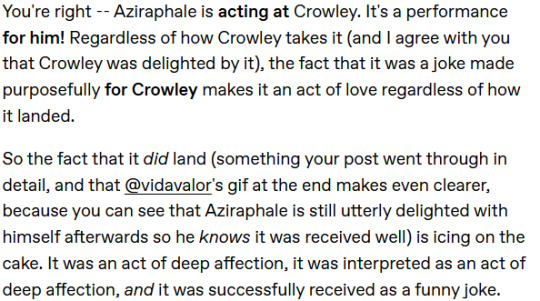
Totes agree with all of this.
And then. AND THEN!
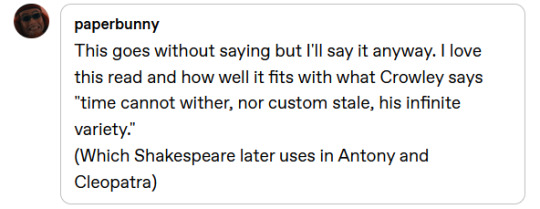
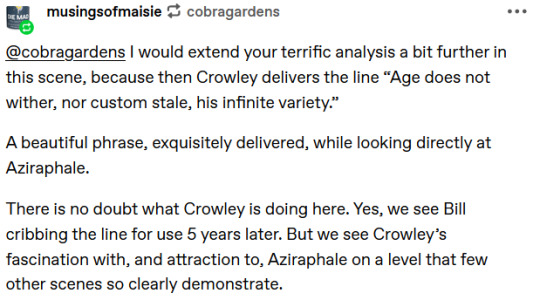
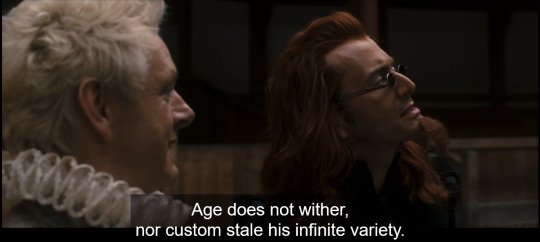
I knew Crowley was trying to communicate something with this Shakespeare line, but I didn't know what until @paperbunny and @musingsofmaisie put it out there: Crowley is complimenting Aziraphale here, telling him he's enjoying being in Aziraphale's company, telling him his humor worked.
Remember how I keep banging on about how much equivocation Crowley does? This is more equivocation. In 1601, Richard Burbage was 34 years old, so age hasn't had the chance to wither his infinite variety yet. The stupidity of demons and the ignorance of angels regarding the human aging process prevent surveillance from noticing the poor applicability of this line to Burbage, but since the first half of the line fits Aziraphale (who does not age at all) more than Burbage (who is merely not yet old) it stands a chance of indicating to Aziraphale that Crowley is speaking about him. And the underlying true meaning of this equivocal statement would be A DIRECT RESPONSE TO MY FAVORITE MOMENT: Even though I have known you so long, you still surprise and delight me.
(Crowley's Antony & Cleopatra line also accomplishes something else important: it gets William Shakespeare to go away so they can speak privately, because Shakespeare doesn't want them to see him writing it down.)
A Dip Into Speculation
I don't think the evidence for it is binding enough to say for sure, because the evidence is really just that it fits together so nicely and lines up so well with A&C's coded romantic messages in 1793; the (pretty overt, actually, I mean damn) romance in 1827; the size and nature of the fight in 1867; the yeah, really overt romance in 1941; and in 1967; and yes okay now that I'm thinking about it the whole series, but I have this View about how the rest of the 1601 scene goes.
And in fact there is Word of Gods that could be interpreted as evidence against this little pet headcanon I have, though it doesn't necessarily have to be:

Here's my assertion: Aziraphale volunteers to go to Edinburgh for Crowley. Crowley cheats the coin toss to accept Aziraphale's offer and to keep up appearances as a demon. Rather than making a deal with (or asking a favor of) an angel, he's 'cheating' him (without the angel's knowledge, but with his consent), which "moves the dials" of evil a bit and would also make Aziraphale appear less at fault if this instance of the Arrangement is ever discovered by Heaven.
This can coexist with Gaiman's statement, above, that it doesn't even occur to Aziraphale that Crowley cheats the toss. THEE ongoing leitmotif of Aziraphale's view of Crowley is that he thinks of Crowley as much more genuinely evil and much less in need of ways to create cover as evil than Crowley actually is.
(Which is interesting, given that he also clearly thinks that Crowley is not as evil as he pretends to be, that he is and wants to do good, and that he deserves to be an angel again. [There is a whoooole nother essay slowly curdling in the churn in my head about how Aziraphale is obliged to practice doublethink and how that stunts his personal development because that's what happens when people aren't free.])
Here's what I mean when I say Aziraphale volunteers.
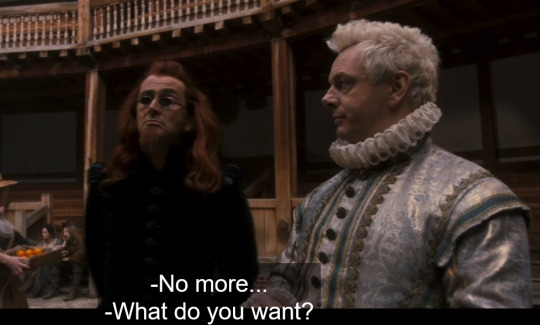
Does Aziraphale ask in this tone because he is actually feeling suspicious and curt, or because he has to sound suspicious and curt? He could be perfectly willing to do Crowley a favor and would still need to sound the way he does. It's difficult for me to believe this guy--
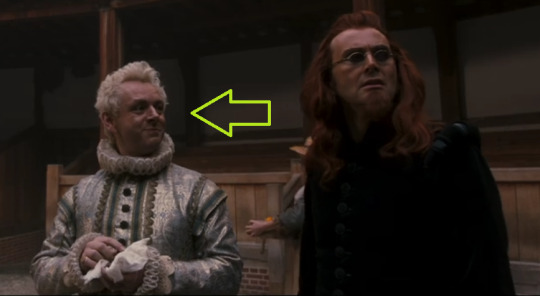
--or this guy--

--are really all that bothered by the idea that Crowley might want something from him.
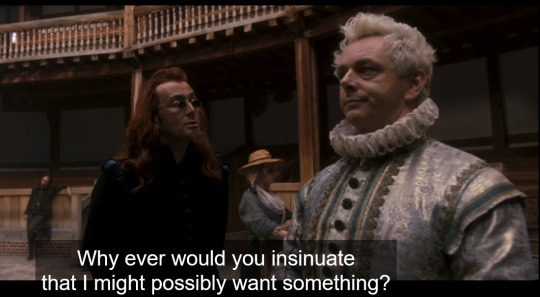
Crowley's response sounds like a(n unconvincing) protest of innocence. Maybe it is. But he doesn't disagree with the premise on which Aziraphale based his question, which means Aziraphale now has confirmation: Crowley called the meeting because he wants to ask Aziraphale to do him a favor.
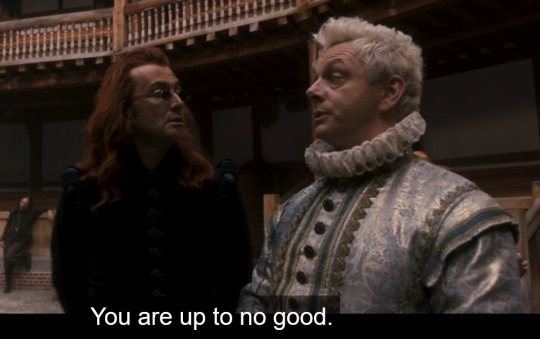
Close your eyes and listen to Sheen's delivery of this line. The way he says it is so soft it's got no judgy angelic sting to it at all. Is this really a prissy answer to Crowley's semi-rhetorical question? Or is Aziraphale using the cover of a prissy answer to ask Crowley, Is what you want related to the no-good you're up to, i.e., demon work?
Either way, Crowley answers:

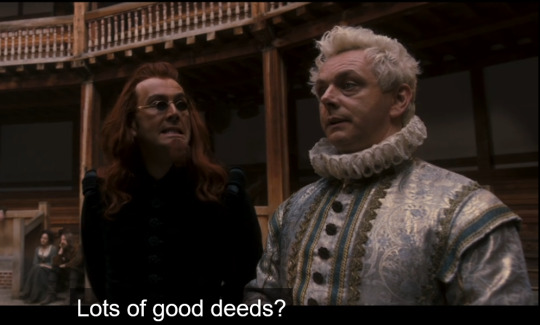
Is Crowley making a demonic jibe at Aziraphale in return to "You're up to no good," or is he telling Aziraphale, Yes, what I want from you is related to my work, and to your work, esp. what you've got on right now?
Aziraphale volunteers some information about his schedule and what it is he's got on right now.
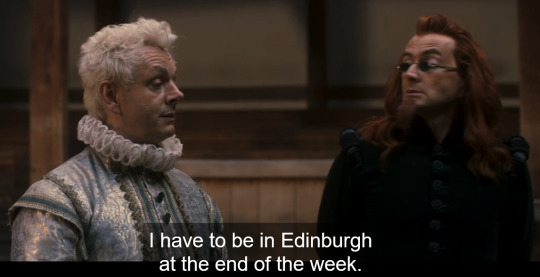
--he says, and the velvety way Crowley says "Ohhh," tells us--and could tell Aziraphale--that Crowley already knows this. In this coded communication I'm suggesting, Crowley's tone on "Oh" confirms to Aziraphale that the thing he wants help with does indeed have to do with Aziraphale's trip to Edinburgh.
So Aziraphale gives Crowley his travel details: Yeah, I have a couple of blessings and a minor miracle to perform. It's going to suck; I have to ride a horse.
Crowley's like, yeah, riding horses does suck. You have my sympathies. (Phrasing it as an insult to God: "Major design flaw if you ask me.") And then he says, I have to go to Edinburgh too this week. Tempt a clan leader into stealing some cattle.
And here's where I think Aziraphale volunteers to do Crowley's Edinburgh job for him:
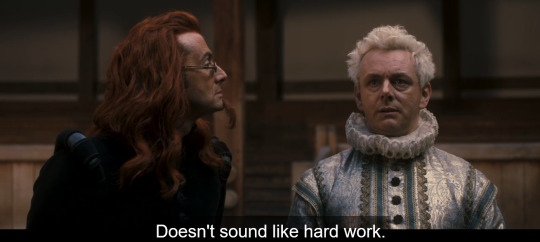
If, as I propose, Aziraphale understands already at this point that Crowley is asking him to take Crowley's Edinburgh temptation, then this response tells Crowley he's willing to do so.
And then they have a little bit of kayfabe theater and a little bit of miscommunication between themselves. Crowley suggests Aziraphale take Crowley's Edinburgh job. Aziraphale protests "You cannot actually be suggesting what I infer you're implying," even though, as Crowley immediately points, out, they've now done this dozens of times.
Now, obviously Aziraphale is pretending innocence here with "You cannot actually be suggesting," etc. But he's not pretending innocence to Crowley. He can't be: Crowley knows about the dozens of other times just like Aziraphale does. So the protest of innocence is for surveillance; it's the spirit, not the letter, of the protest itself that's genuine: I am reluctant about this.
And Crowley misses it.
He reads the surface layer of the equivocation, the Heavenly pearl-clutching; and the surface layer is where he argues. "We've done it before," he points out. "Dozens of times now. The Arrangement--"
But Aziraphale, visibly frightened and looking around, cuts him off. "Don't say that." Getting caught in an Arrangement would be much, much worse than getting caught in a one-off deal.
Why is this suddenly a problem? says Crowley. You know we've been getting away with this; you know they don't check up.
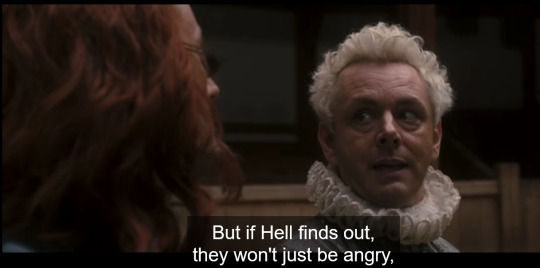
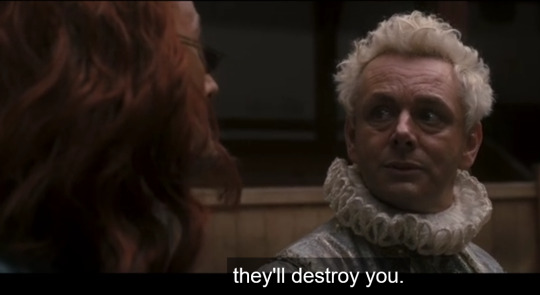
It's not pearl-clutching at all; Aziraphale is worried for Crowley's safety.
When Crowley says--
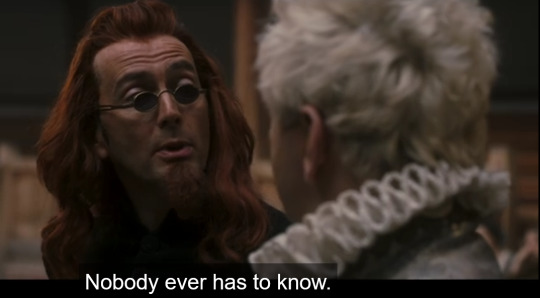
--is his tone half wheedling and half impatient because that's how he feels, or because it must sound like that? Is it soft only out of courtesy to the other people in the Globe?
There's no difference to the outcome of this scene or the story as a whole whether this romantic interpretation of the Edinburgh bickering is correct, because we've already got a solid base of evidence that the characters have romantic feelings for each other and show each other affection and care in this scene. In my opinion this interpretation fits the tone of the rest of the Globe scene better than only the face-value interpretation. What Gaiman and Mackinnon say about Crowley cheating the coin toss and Aziraphale not being aware of it can still easily apply.
While these three statements together aren't enough evidence to convict, so to speak, if my initial argument about the interpretation of "Buck up!" and Crowley's reaction is correct--and the cool stuff other people have found and pointed out suggests it is AND explains Crowley's Antony & Cleopatra line--this reading of the Edinburgh bickering is, if not ironclad, at least valid.
And holy shit, people, that makes this scene romantic af from beginning to end. I could not have asked for a better little gift from my fellow humans. 🤯I have such a better understanding of the entire 1601 scene because people from anywhere with an Internet connection sat down and spent their time sharing their ideas, and it just makes the lit-nerd lobe of my brain so happy. I love you all, you romantics and nerds and perverts.
#good omens#good omens 1601#ineffable husbands#aziracrow#it turns out my favorite good omens moment keeps going for the rest of the scene#good omens equivocation#crowley equivocation#aziraphale equivocation#good omens meta
338 notes
·
View notes
Text
I was just rewatching crack videos of Sherlock and while I love Sherlock, really, it just sort of hit me again. like. how much more Good Omens means to me. you know?
in good omens the two main characters are in one of the healthiest relationships I've ever seen, while it's a comedy none of the characters are just caricatures for the bit, there's so much genuine representation that's integral to the storyline, the women aren't 'defanged' (as I remember one critic of Sherlock saying, accurately, I think, because most of the women in Sherlock end up losing their agency or being outwitted by Sherlock, especially Irene who in ACD's canon outwitted Sherlock), the queerness is just so understated and real.
and I could go on and on and on. how the second season doesn't try to blow up the first season in terms of scale, which shows so often do, but instead retains its spirit and does what it does well rather than becoming some heavily action-driven mess. it's a story with so much heart and plot and character and everything.
ANYWAY WE ALL KNOW I ADORE GOOD OMENS, I'M THE BLOODY MASCOT OF THE FANDOM, BUT I JUST WANTED TO SAY IT AGAIN. HOW MUCH THE SHOW MEANS TO ME. HOW BEAUTIFUL AND LOVELY BOTH AZIRAPHALE AND CROWLEY'S ROMANCE AND FRIENDSHIP ARE. HOW DISTINCTIVE THE STYLE OF THE SHOW IS. HOW LOVELY THE SIDE CHARACTERS ARE. HOW QUEER IT ALL IS. THE WRITING THE ACTING THE DIRECTION THE STORY THE EVERYTHING.
It's just so rare that I can watch something and not have to wince and think ah, yeah, that bit, that's oof, but overall I love it. Instead when I watch Good Omens I'm always like AH YEAH THAT BIT OH MY GOD I LOVE IT SO MUCH.
#good omens mascot#weirdly specific but ok#asmi#maggots#good omens#good omens fandom#crowley#aziraphale#lgbtqia#neil gaiman#queer tv#queer media#tv shows#I LOVE THIS SHOW OK#WE ALL KNOW IT#BUT I'M YELLING IT AGAIN#I LOVE. THIS. SHOW.
136 notes
·
View notes
Text
So in my ongoing efforts to say nice things about Supernatural and, as @luckshiptoshore said yesterday, "reclaim this nice, gay show" together, and also probably because I listened to Bruce Springsteen earlier today while I was thinking: why is it that this particular love story has me like it does? Why can't I let this Destiel thing go? I mean... I watched all the recent queer love stories and as much as I enjoyed Good Omens and OFMD, they just don't take up real estate in my soul like Supernatural does -- and that's not a decision I made, it just is. I don't know about you guys, but my little rages choose me.
Anyway, I was thinking -- it's probably not just because of queer representation or whatever, and I don't think it's because I want to see dudes be tender -- I think I ran out of that form of interest in the life of dudes awhile ago, but yeah, Bruce Springsteen. Born to Run. He says "I want to know love is wild, I want to know love is real" and I felt like it pretty much hit the nail on the head for me, somehow.
It's been a long time since I have felt moved by a het romance story. I feel like I can no longer believe it when the roles are so pre-packaged in the tropes and trappings of what was sold to me as idealised love in my younger days. And, like, I am Gen X, so it was pretty gruesome out there when I was learning how to want love -- the power of compulsory heterosexuality was strong, and the shit that was sold to us all as ways to love and be loved were pretty gross, just watch any romantic comedy from the 80's or 90's.
I think I love Supernatural so much because of the way Dean plays the role of a standard issue dude, and postures like he is a stereotypical red-blooded American dude, but it's so transparent that it isn't him. I don't know if it's just Jensen things, or if it was consciously done, but I love how unconvincing Dean's act is, and how clear it is that he is a wounded child whose own real desires and needs have been beaten out of him somehow, and I just love the way the real Dean and what that guy wants slow rises out of him as the story goes on, until he's choking on it, and visibly swallowing it down. For me, the queerest thing about Dean is his pain, his aching loneliness, and his sense of failure at being what he thinks he is -- a violent man who only knows how to kill, and I love Dean's moments of clarity, moments when he speaks from his own soul -- when he tells Cas he's sorry, tells John he has a family, tells Chuck "that's not who I am" are just everything to me.
Both Dean and Cas are victims of conditioning and coersion -- Dean trying to be his Daddy's perfect son, and being manipulated by Chuck, and Cas horribly violated and brainwashed repeatedly for millennia in heaven -- and they love each other in defiance of conditioning, because love is wild, and it's the product of their freedom.
I feel like ALL actual love eschews force and arises out of freedom. All real love is specific and weird, and is co-created in the space between lovers from what is most real in them and in that sense, all real love is queer in some way in that it is not part of the big social project of subjugating what doesn't comply. I feel like a lot of people lead lives of mindless compliance and that a thing that's wonderful about queer people and queer community is that we work against the grain to honor what is truest in us, whatever that is.
I guess I just love that, on Supernatural, the kind of love that saves the day is the kind that grows wild, like a weed you can't kill, out of more than a decade of choosing each other, again and again, and choosing to fight coercion and conditioning. Love that just fucking refuses to comply, and in fact, cannot comply, because non-compliance is it's very nature. There's something so hopeful and beautiful about that to me. I want to believe in it, and I do.
It's also why, after ALL THIS, in the context of that narrative, Dean is incontrovertibly queered, and anything else is just straight up narrative malpractice.
117 notes
·
View notes
Text
I was talking with someone about just how canon the ineffable husbands are in good omens and I brought up how Gaiman said that what they have is canonically a love story (which is really reflected in the show, with their moments of vulnerability towards the other, their despair at the thought of losing one another, their comfort with eachother, the way they stick together through millennia even when they're never trying to, etc), but they don't have labels, as they don't have genders and the human conception of intimacy eludes them as ethereal beings that aren't human
And the complications with that
Because this person I was discussing with is not as versed in fandom discourse, and so they're only now finding the vocabulary of "queer baiting" to talk about that Sherlock show
And so they're like "I hope I see Crowley and Aziraphale absolutely eat eachother's mouths, it has to be canonized" and I'm standing here like. It is canon though. Like they won't add some "hetero romance" cop-out last minute. They are canonically in a love story. What's interesting is how the label-less queerness of it can also explore non-binary aspects and an aroace perspective on what "love" is
And they're bummed out because if they don't "absolutely eat eachother's mouths" it doesn't feel as canon to them. And I'm still standing here in aroace like. Bro. There are so many forms of relationships. A kiss on screen doesn't have to make it any more or less canon
But at the same time, from the amatonormative perspective, I get how the kiss on screen is seen as the end all be all. Because in general media, the main pairings will have the kiss at the end. And they will live happily ever after with that
Before the kiss it is only as canon as the kiss is predictable, and after the kiss, you can point to that one scene as "the moment it was canonized for realsies despite even people in the show making constant remarks about this being an obvious thing"
And I kinda hate it
I just wish the whole community wouldn't have to keep its guards up like this so much to discern whether something is coming from a genuine place of wanting to tell a story for a queer audience or about a queer subject or if it's all just a ploy to get our money, spit in our faces, smile at the traditional homophobic crowd and fund some conservative party with it
Because then we wouldn't have to play it by the boring straight rules. If everything points to it being obvious, then why is an intense kiss necessary? Why is it all you want? Why can't this represent a qpr? Or a loving relationship where intimacy in the form of a kiss just isn't something the characters want? Or a more open thing instead of being a purely monogamous arrangement? Or something completely new, a dynamic you can only describe in an essay lest you don't make their chemistry justice?
Aren't all of those just a much more under-thought about queer dynamics than what "I want these characters to kiss eachother until they can't remember their names on screen or else it isn't canon enough" can convey?
But at the same time, without something as concise and strong in media language, how do you make sure it won't all stay in just subtext and the reason it looks like clear text to you is because you're starved for queer stories and have become way too accustomed to reading between the lines?
I mean, it's also been proven to not be an absolute in instances where the text goes ham in letting you know what it's saying, when it's not implying, it is just telling. For one, Rose and Pearl in Steven Universe never did share a kiss on screen, and nevertheless we all know what was going on there
Idk, it's complicated and it's 1am, and this is all just a ramble, but I am in my aroace hating amatonormativity mood and the sentiment that characters being a canon thing without an explicit kiss bums someone out to the point they say "ok, ok, I get the whole nb ace ethereal beings that aren't human idea, but I want something more explicit because it doesn't feel canon enough" when that isn't strictly necessary for the story to get it across just got me in a weird mood and this is about so much more than good omens, I needed to try and word it out and might as well put it out there
Just. Why does queerness have to be allonormative and also amatonormative to be valid in the eyes of the queer masses necessarily? You'd think we'd figured out that queerness goes beyond just the L, G, B and binary T by now
#kitsu rambles#aroace#aro#aromantic#ace#asexual#good omens#steven universe#ineffable husbands#crowley good omens#crowley#aziraphale#aziraphale good omens#amatonormativity#allonormativity#queer baiting#fandom discourse
677 notes
·
View notes
Text
Merc Shipping Vs The Administrator (AKA, The Power of Love Vs The Power of Hate)
Something I keep thinking about is the Romeo and Juliet parallel between BLU Soldier and RED Demoman in the WAR! comic, and how you can apply it to every merc ship configuration.
Because I think the Romeo and Juliet parallel is definitely intentional on the part of the comic creators. Canonically, Soldier and Demoman's relationship is one of friendship (it's given that label by the Administrator), not romance. But the whole thing is purposely framed like a forbidden romance story. So it's not canonically a romance, but it's read like a forbidden romance. It feels like a forbidden romance. Because it uses the tropes familiar with a forbidden romance story. To elaborate...
The study of tropes is the study of patterns in storytelling. As you experience different media, you start recognising patterns and what different patterns are trying to communicate to the audience (you). By doing this, you are gaining media literacy by understanding the language of storytelling. And by "language," I don't mean "French/English," I mean colour theory, subtext, and tropes. Media has its own language beyond English.

So, breaking down parts of the WAR! arc, the Administrator gives the following in-game dialogue regarding Soldier and Demoman's relationship:
"Betrayal will not be tolerated."
"You cannot hide anything from us, mercenaries. And now you will pay the price."
"It's not too late to repent, kill your friend now and end this. Listen to your conscience!"
"Friendships are in direct contravention of mercenary conduct as delineated in your contracts; and on a personal note: I am very, very, disappointed with you."
"I won't single any one of you out. I will just say that some of you have betrayed the trust of your employers...and because of that you must die. The rest of you are *cough* satisfactory." - The Administrator
There's additional bark lines, but I'm highlighting these because they focus on the forbidden aspect of the friendship, and how the friendship is a thing to be punished for. Stick a pin in this.
To do a quick summary of what happened, the Administrator discovers a series of surveillance photos showing BLU Soldier and RED Demoman hanging out together in various places outside of work hours. The Administrator is now finding out about this because she is their boss (and has the authority to have access to this surveillance stuff) and because Soldier and Demoman didn't tell anyone about their friendship (read as: they knew it would be frowned upon and tried to keep it a secret).

This "person of authority discovers their wards are having a forbidden relationship in secret" moment is a trope as old as the hills. In Romeo and Juliet, it was their family finding out about their romance, and before that, the fear of being discovered is what hangs over them for the majority of the story. Like Soldier and Demoman, Romeo and Juliet are on opposite sides of a feud that has lasted longer than their own lifetimes. And it is expected of them to take part in this feud as enemies.
(Season 1 Good Omens spoiler in next paragraph, feel free to skip it.)
If you want a more recent and modern example, there's the fantasy romantic comedy Good Omens, wherein Aziraphale's boss, Archangel Gabriel, finds out through surveillance photos that the angel Aziraphale and the demon Crowley have been hanging out together in secret, while Aziraphale insisted to Gabriel that he and Crowley were enemies in the Heaven and Hell war. The scene beat for beat feels the same as the Administrator finding out about Soldier and Demoman, complete with a "photos splayed across the table" shot.


Even Team Fortress 2 has used this "photos across the table" trope before, and it was for the reveal of RED Spy's romance with Scout's mother. TF2 used it in association with forbidden romance before the WAR! comic. (Meet the Spy released May 2009, while WAR! released in December 2009.)



Some other romantic connotations I observed in WAR! were that the different photos illustrate a different romance trope.
In one of the photos, Soldier and Demoman go to Las Vegas together. Visiting Las Vegas is a trope in fiction where the main character goes there and spontaneously gets married during their stay. This is because Nevada, America does not require a waiting period between obtaining a marriage licence and the marriage, making it ideal for writers trying to justify a surprise marriage storyline. The trope was also popularised by the 2003 slogan, "What happens in Vegas stays in Vegas," and has since been associated with the implication that characters who visited Las Vegas together secretly got married while there.
There's a joke in the series Gravity Falls that references this trope:


In the Las Vegas photo, Soldier and Demoman are with two women (so they are not just together by themselves), but the marriage association is still there.
Soldier and Demoman also went to a museum together, a sports game, a bus tour, and went on a fishing trip together. Bonding outings where they got to know each other. These can be read as going on dates together if you are using a queer reading to view the story.
So, there's two readings happening on top of each other. There's the canon reading (or text reading), and there's the subtext reading (specifically, a queer reading). And you can read both at the same time.
Canonically, this is a friendship where it's forbidden because Soldier and Demoman are on opposite sides of a war. The Administrator doesn't want this friendship to continue because it puts her plan (of secretly playing to both sides) in jeopardy.

A subtext reading is that this is a romance where it's still forbidden because Soldier and Demoman are on opposite sides, but it can also now be read as forbidden because gay relationships were criminalised at the time (Team Fortress 2 is set in 1968, which is exactly one year before Stonewall happens). Historically, gay relationships in fiction have this association with forbidden romance in particular because its criminalisation required secrecy and discreetness for the gay relationship to exist, and socially it wasn't accepted by the general public (it was stigmatised as a criminal act) and was thus seen as taboo. So in stories, it had (and still has) this association with forbidden-ness and secret-keeping.
There was also the Hays Code, which was created (in part) to stop films from including gay characters and gay relationships and that criminal acts should be punished by the end of the movie. Filmmakers got around these rules by queer coding villains (using queer signifiers to imply a character as queer without making it canon) and using subtext and metaphors. The Hays Code has since been removed, but it was used during almost the entirety of the Golden Age of Hollywood (read as: formative years that created many of the staples of filmmaking), so its effects can still be seen in today's media. Such as writers using secretive friendships as a metaphor for forbidden queer romance.
If you edit the plot to Soldier and Demoman having a secret romantic relationship rather than a friendship, the plot arguably stays the same and requires minimal changes to the plot beats.
And in addition to this relationship jeopardising her plan, the Administrator may not want the mercs to form romantic bonds between them that could stop them from fighting and killing each other and get them to question the point(lessness) of the Gravel War.
Basically, she doesn't want the Gravel War to end through some act of the Power of Love. Which, thinking about it, the Power of Love is the antithesis of the Administrator's way of getting what she wants. She runs on the Power of Hate. She uses it to keep the war going, by arranging things so that the Mann brothers never end their rivalry. She found a way to prolong both of their lives so that their feud would not end through death or forgiveness. She benefits from hatred and it's how she retains her power.

So, the Administrator uses her power to break up Soldier and Demoman. She tries to incentivise them with new weapons and items. That doesn't work. She lies and tells them that the other merc betrayed them, using fake evidence and the merc's trust in Miss Pauling. She uses her knowledge of what the mercs fear most to manipulate them into thinking the other betrayed them. It's only then that Soldier and Demoman agree to killing each other.



Using the romantic interpretation, the Administrator is using her power to end the forbidden relationship. Making Soldier and Demoman star-crossed lovers that were pulled apart by an authority that watches over them.
Alongside the WAR! comic, the game had an update where you played as Soldier or Demoman and got rewarded for specifically targeting and killing the other. These kills were tallied collectively and used to basically vote for which class got a particular new weapon/item reward, which changed the game's design and changed how Soldier and Demoman played.

Even if you missed the WAR! arc update that happened in-game, you still get to play out an aspect of it through completing this achievement for Soldier:

And this achievement for Demoman:

They killed each other 500 times.
Respawning, although not talked about in the comics, is mentioned enough that it appears to be canon or at least acknowledged in-universe by the mercs. It's not just a video game thing you're meant to forget about or pretend doesn't exist.
"See you in five minutes." - Sniper, upon killing a merc.
Medic's Reanimator device in Mann Vs Machine mode is also shown in The Sound of Medicine Valve animation and is used to bring Heavy back to life. So in-universe, death does not stop the mercs, and they therefore can die repeatedly as a punishment.


This is why merc shipping has such a strong element of danger and stakes to them, whether it's a cross-fraction or same team ship. If they are all aware of the Administrator's authority and how much she spies on them, they would all be fearful of being in a relationship with another merc because they'd be worried about the punishment they would receive if they got caught.
The Administrator didn't just go, "You're fired," or, "You're dead." I think this is very important to keep in mind. Those two options weren't good enough. The Administrator punishes people on the level that GLaDOS does because she has that same authority. She instead went, "You're going to kill each other 500 times over. Each. And you're going to enjoy it. I'm going to arrange things so that you hate each other by the end of this."
Can you imagine what she would do if she had so much as an inkling that the mercs have fallen in love?
Going back to canon, I still don't know how the TF2 comics will end, but if issue 7 ever comes out, I wonder if the Administrator's ultimate plan will get foiled through the merc's teamwork. Does teamwork defeat a century-old plan created by rivalry and greed?
Does the Power of Love defeat the Power of Hate?
16 notes
·
View notes
Text
Twiyor Thoughts!! (Spoilers for SPY X FAMILY Mission 80)
This chapter really got the ball rolling for the next prominent arc, but I wanted to dive into Loid and Yor’s subplot and give my two cents on it because I’m absolutely loving the direction this is going in!
On the one hand, it’s very cute that Yor has to basically make up a gripe about not having gripes to meet her coworkers’ standards of “normal,” all because Loid is A+ Gourmet Husband Material™. He’s so thoughtful and understanding that she thinks she has to make up a reason to be upset with him to pass as normal.
On the other hand, it’s 100% natural to end up having disagreements and get on each other’s nerves from time to time. We obviously see Loid and Yor through the lens of romance, but living in the same space as someone else is inevitably going to lead to grievances big and small. That applies whether you’re living with your partner, your relative, your best friend, anybody!
So having a minor spat over basically nothing now might actually be good for them! Yor needs to feel self-assured enough to speak her mind when she doesn’t agree with something, and Loid needs to be able to hear her criticisms without instantly catastrophizing and assuming that Yor wants to leave him every time she’s even vaguely upset.
I think if these two sat down and fessed up to each other how much they don’t want to lose each other this arrangement, then they would realize that not every single problem in their relationship is an omen of the apocalypse. These two have zero sense of normal and it shows, but at the end of the day, they’re kindred spirits no matter how this subplot shakes out. Most of us want them to start smooching already, but even just as friends or teammates, they work together really well. They understand each other more than they know. So if they hit a bump in the road now and realize that it’s just a bump and not a giant, marriage-destroying chasm of doom, they will be an even stronger unit than they were before.
Plus, I mean, the last time their relationship suffered any turbulence was because of Fiona and her BS, and that led to some of the best Twiyor moments to date, so I think we’re in for a feast in this arc, folks. I’m really excited to see how this all ends up working out. The last time I made any hard predictions, they were dead wrong, but I’m open to all sorts of possibilities for how this subplot could work out by the end of the arc (if it even ends there and doesn’t just keep going in the background for a long time).
Bonus opinion: Yor needs better friends yesterday. Sharon is like the only one who kinda takes up for her, the other two still scrutinize her like crazy. And her only alternative is… Melinda… oof.
#twiyor#spy x family#yor forger#loid forger#sxf#yor briar#spyxfamily#yor briar forger#loid x yor#agent twilight#thorn princess#loidyor#spy x family manga#spy x family spoilers#sxf manga#spy x family manga spoilers#sxf manga spoilers#spy x family chapter 80#sxf chapter 80#spy x family manga chapter 80#sxf manga chapter 80#spy family
103 notes
·
View notes
Note
Since I didn't communicate clearly earlier:
2, 3, 4, 5, 6, 7, 8, 9, 10, 11, 12, 13, 14, 15, 16, 18, 19, 20, 21, 22, 23, 24, 25, 26, 27, 28, 30, 31, 32, 33, 34, 35, 36, 37, 39
Oh, God lord, Sam
Okay, yes, yes, sure
Just, be prepared for a long post I guess then. Ill skip the ones I already answered
2. show us a picture of your handwriting?
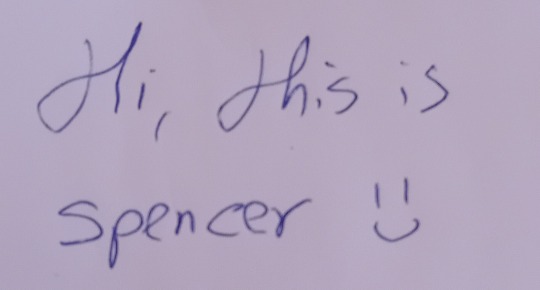
3. 3 films you could watch for the rest of your life and not get bored of?
The Imitation Game, The Muppet Christmas Carol and Corpse Bride
4. what’s an inside joke you have with your family or friends?
Ah...a evil version of "You've got a friend in me" from Toy Story with one of my friends
5. what made you start your blog?
Honestly? No idea. Technically I've been here since 2014 and I kinda just joined to see pretty pics in the beginning. And now here we are, neck deep in the Good Omens fandom
6. what’s the best and worst part of being online/a creator?
The best is honestly the interaction. You guys really have no idea how nice the Good Omens fandom is. I used to be a "creator" for the Yuri on Ice fandom and it didn't used to be half of this. It's very exciting.
The worst? Maybe the pressure to post new stuff? Which is not exactly no one's fault but mine, but alas
7. what scares you the most and why?
Ah. Dying in pain? I don't like pain and I don't appreciate dying so, yeah. Kinda logic
8. any reacquiring dreams?
I don't think so?
9. tell a story about your childhood
We went to the beach this one time and I, for some reasons, made friends with this one guy I never saw again in my life. Somehow he caught a big ass fish (or big in toddler scale) and gave it to me and my first reaction was toss it back into the ocean. It was a magnificent throw, lemme tell ya. For a 3 year old, anyway
10. would you say you’re an emotional person?
It depends on how mentally stable I am and who I am with. But yes, overall, I would say so
11. what do you consider to be romance?
Small things, like sleeping cuddling, cooking together, drinking coffee together at the window in a sunday morning, kissing in the rain. My idea of romance is very...fairytale-y. And not realistic. That's why I am very very good by myself
12. what’s some good advice you want to share?
Don't look for yourself in other people. You're good enough to make yourself happy. You don't need anyone else so don't think you do. Other people are a bonus, not a requirement
13. what are you doing right now?
Answering this long ass thing thanks to you, Sam
14. what’s something you’ve always wanted to do but maybe been to scared to do?
Piercings. I've conquered my fear of tattoos and piercing are next, write what I'm telling you
15. what do you think of when you hear the word “home”?
My grandma's house
16. if you could change one thing about yourself, what would it be?
Physically? My weight. Because I've been fighting it ever since I was like 4 and so I could go under surgery and change my chest.
In general? Just...I would like to be more simple. I feel like other people in the world are way simpler than I am. Think and feel in a simpler way. Or I'm too complicated, depends on how you want to see it. I would like to feel simple
18. do you believe in ghosts and/or aliens?
No, to both. If I allowed myself to believe in any of those I would become way too paranoid and that's a no no
19. favourite thing about the day?
Getting home after a long day
20. favourite things about the night?
Actually getting to sleep properly, which is being an impossibility at the moment
21. are you a spiritual person?
No. I don't believe in any god or religion or entity. I max believe that the universe has my back and everything will work out somehow. But that's it
22. say 3 things about someone you love
My grandma is an amazing cook. I love her snuggles. I miss her every day
23. say 3 things about someone you hate
My uncle was assaulted last week, aparently. Not to be mean, but he could have died. I wish he had died
24. what’s one thing you’re proud of yourself for?
Not having killed myself when I really really wanted to. Living is super nice and I enjoy it quite a lot
25. fave season and why?
Autumn. Because it's when I was born and it's spooky season! And hella cozy! I love cozy!
26. fave colour and why?
Blue. Because it feels calming and reminds me of the ocean and/or water in general
27. any nicknames?
My friends used to call me "Mouse" when I was in school. It was an inside joke
28. do you collect anything?
I collect books and military jackets
30. what’s one thing that never fails to make you happy/happier?
Honestly? Without being sappy, you guys. Every time I'm having a shit day and I come here to complain y'all manage to cheer me up. It's very sweet and I thank you very much
31. are you messy or organised?
I am proudly organized in my messiness
32. how many tabs do you have open right now?
On pc? 4
On the phone? 48. 47 of those are fanfics
33. any hobbies?
Mainly reading and writing. I don't have time for much else
34. any pet peeves?
When people are slow. Not only walking, but in general: thinking, moving. It annoys the shit out of me
35. do you trust easily?
Oh no. Not at all. I think the only people I currently trust are my grandma and my therapist. And one of them I pay them to trust them so-
36. are you an open book or do you have walls up?
Way way too many walls up. I've been broken more times than I care to count and that does something to someone, lemme tell ya
37. share a secret
I stole a Hello Kitty necklace from a girl I hated when I was like 7. I still have it, as a trophy. I really hated that girl
39. youtuber you’ve been obsessed with and why?
Pinely! He's so fucking funny and I love his accent. Besides, his videos are amazing. Go watch it!
Ooof, okay. That's it, right? I tried to give short answers so it wouldn't get too annoying, but there we are. Hope you're happy, Sam!
6 notes
·
View notes
Text
bye I just have to talk about Good Omens for a sec since victoria and I watched S2 this weekend and I'm already rewatching it so I can pay more attention this time bc I know what happens now and am not like. desperate to find out. y'know like when you read a book the first time and you read it really fast and kinda skimmy bc you're just like WHAT HAPPENS NEXT so then the next time you read it you pick up on stuff you missed the first time simply bc you weren't reading carefully bc suspense.
okay anyway there will be spoilers so I'm gonna place a "read more" and also tag. so DO NOT keep reading if you don't want Good Omens S2 spoilers.
okay so I partly want to talk about this on a craft level? bc I was thinking the whole time about OFMD and how like. y'know, it's marketed predominantly as a ~comedy~ but it's a ROMANCE and if you know romantic beats then you recognize that bc you see the romantic beats? and GOS2 felt very much that way, where like I was seeing the romance beats and they made the brain go brrr. like obviously it's not the SAME bc Ed and Stede had never previously met whereas Crowley and Aziraphale have been running around together for millennia, but
Crowley saying to the nebula "you're gorgeous" and Aziraphale being like :D until he realizes Crowley wasn't looking at him
Aziraphale being DEVASTATED when he thinks Crowley has killed the goats and IS going to kill the kids but then being like !!!!!!!!!! when he realizes Crowley actually didn't kill the goats and isn't going to kill the kids
Crowley being the one to understand and offer Aziraphale comfort when Aziraphale thinks he's fallen
the moment you can see Aziraphale realize he's in love with Crowley in that church in 1941, there's the look on his face and ALSO the romantic music at that moment bc he has Realized
Aziraphale afterwards constantly stumbling over "my.......friend" when he has to introduce Crowley to people and isn't sure how to do it because yes they're friends but also it's something other than that to him
Crowley constantly being SO there for Aziraphale without even really realizing he's doing it (like yeah he gets >:[ about it sometimes, like when they argue about helping Jim and he initially says no and then goes back, but he always goes back anyway)
everyone—LITERALLY EVERYONE, heaven, hell, humanity—thinking they're legit a couple and just taking it as accepted fact, like it's not like it's played for a joke (I mean it is FUNNY but it's not the way it is on Supernatural when people assume Sam and Dean are a couple instead of brothers), it's just literally a thing everyone thinks. like Shax is like "I didn't used to believe it [but now I see it's true]" and Nina literally won't accept that they're NOT a thing even as Crowley is actively protesting
THE MOMENT CROWLEY REALIZES after Nina does that, where he's like. wait. WAIT. w a i t . and you can just see his whole universe turning on its axis bc he's never realized BUT NOW HE IS REALIZING AND—
there are more, obviously, but I was mostly focused on the ones BEFORE the romance became. well. I was gonna say explicit but this was all pretty explicit lmao, but I think the moment where Crowley realizes what's up is the moment it gets into territory that makes it much harder for the advertisers to say "besties :)" even though they totally still will.
BUT ALSO!! can I please just shout for a moment about how much I LOVED that like every major couple on the show mirrored Crowley and Aziraphale's relationship?? like from a craft perspective my brain was just going BRR BRR BRR BRR BRRRRRRRRRRRRRRRRRRRRRRRRRRRRRRRRRRRRRRRRR bc I fucking loved the parallelism and especially seeing romantic couples that mirrored them where like, it's the kind of thing where if the network wouldn't LET neil make the queer romance explicit, you'd write that in intentionally to signal to queer viewers, "hey, the network is being a dick about this, but YOU will know that I DO mean for their relationship to be a romance"
but instead we got the signaling AND we got explicit queerness from the MCs (in more ways than just the romance btw which I feel is important to point out, bc while I am overjoyed that we DID get a queer romantic arc and a queer kiss onscreen, the show and these characters would not be any less queer in the absence of this romance) and I just !!!
Elspeth and Morag - you've got the one who does something bad and isn't particularly bothered about it and more importantly does it to keep food on the table (so to speak), and the one who's good and devout and can't stand by the bad thing even if it's to help them (but ultimately does in fact actually go out to help with the bad thing bc the "good" one loves the "bad" one)
Nina and Maggie - more explicit parallel that's MADE very explicit by Nina telling Crowley that he's like her, the kinda jaded cynical one and the one who believes in magic and goodness (and also the one who believes in magic is CLEARLY head over heels in love with the cynical one, while the cynical one hasn't realized how much they like the one who believes in magic lmao)
Beelzebub and Gabriel - okay I mean this one's a gimme bc it is QUITE LITERALLY Crowley and Aziraphale in that it's a demon and an angel that, as it turns out, have been working together and meeting secretly for ages and have gone from supposed enemies to reluctant allies to allies to friends to lovers, with the main difference being that it seems Beelzebub was more obviously in love first in their case lol. CAN I TELL YOU HOW I SCREAMED WHEN GABRIEL MADE THE JUKEBOX ALWAYS PLAY THAT SONG JUST BC BEELZEBUB LIKES IT
anyway 11/10 loved that no notes
okay I actually have more to say bc on the one hand YES the season ended in a DEVASTATING WAY (again a la OFMD—except that Crowley and Aziraphale got to have it out, which somehow is slightly less devastating than Crowley just waiting for an Aziraphale who never shows up—and in fact victoria sent me the below pic today lolsob)
...but I admit I'm a sucker for an angsty kiss, and there was SO MUCH explicit queerness ALL OVER THE DAMN PLACE this season and I loved the romantic beats and the parallels between the other couples and Crowley/Aziraphale and the classic Good Omens humor and, well, everything else
like I'm a fan of the book and I loved S1, but S2 is like. like this season was MADE for me. like. that's the good stuff right there
but I'm gonna shut up for now and maybe my thoughts less about craft and more about devastation will be another post lmao

#good omens#good omens season two#good omens 2#good omens 2 spoilers#good omens spoilers#neil gaiman#ofmd
21 notes
·
View notes
Text
i guess it’s that time of year again where everyone says good omens is queer baiting because crowley and aziraphale haven't expressed physical affection and desire and so it’s that time of year again where i mention how much this representation means to asexual and aromantic / aspec people and saying that having two characters (i refrain from saying men as crowley is confirmed genderfluid by the way, which people tend to ignore, i don’t know how you can call a show with genderfluid and non-binary characters ‘nothing but queerbaiting’) have to kiss or have sex to be queer is actually pretty hurtful to people in your own community. crowley and aziraphale not kissing doesn’t make them less queer, also he hasn’t confirmed that there won’t be a romance and keeps saying ‘wait and see’ because 1. he doesn’t want to spoil the show 2. he likely cannot spoil the show legally without getting into trouble
every time i think the fandom is past this, you’re not. and i understand, i understand what it would mean to have a show like this have two leads played by actors of the same gender kiss. but a lot of the fandom who throw around the queerbaiting term (which means something was set up and not followed through on which isn’t true by the way, there’s plenty of room to interpret aziraphale and crowley as platonically in love) always seem to ignore the aspec people who talk about how much this representation means to them and there’s even less aspec representation out there and queer-platonic-partner representation in mainstream media than there is gay romances. and unless some kind of deal with amazon prime is stopping him, if anyone watched gaiman’s other show this year, the sandman, i think it’s safe to say he doesn’t care about cramming as many gay, lesbian, bi and non-binary characters as he wants into his shows. perhaps if he’s not putting a romantic/sexual relationship with aziraphale and crowley it’s because he doesn’t feel it’s right for those characters to express their love that way, they are his characters after all, and maybe they are in love romantically, but they’ll never have sex, or never want to kiss, but they’ll say their i love yous in season two.
it’s a little silly to accuse a show of queerbaiting when the show isn’t out yet, we don’t know what will happen, and containing accusations of queerbaiting and homophobia towards neil gaiman because of good omens despite the release of the sandman tv show and the representation in that show. i understand the want for more on screen queer kisses, but i don’t think it’s accurate to accuse the show of queerbaiting. maybe use that term for shows that have actually done that and had harmful representation, homophobic representation, transphobic representation, shows that have actually caused actual hurt to real lgbt+ people, not just shows that have made you really want two characters to kiss and then disappointed you even though the characters have still been confirmed to be in love, just that love works differently for them than it does for us, and that at least one of the characters in canonically not-cis and the other might be as well. the first show with genderfluid representation that yes could have been more explicit but god it could have been actively transphobic like a different fandom show, the first main fandom show i’ve seen to have characters with they/them pronouns, with neopronouns, just.... i get that good omens means a lot to people, it gave us a lot of hope, but this isn’t he show to go cancel culture on because it hasn’t let the two characters having the slowest long burn of history be ready to kiss yet, or even have to kiss to prove they’re in love
this is just my opinion as a gay trans aspec person who definitely relates to aziraphale taking thousands of years to realise he’s in love and decades later still not be ready to kiss the person he’s in love with. i love my partner, we’ve been together close to a year, and i’m still not ready and comfortable to engage in kisses nor sex yet, and some aspec people will never be ready for that or never want that at all, so yes aziraphale and crowley can be in love and not be ready to smooch yet and it doesn’t make them any less in love. it will say i would like the i love yous to be said i the show and not just on twitter, but then again maybe they’re not ready to say it out loud yet.
queerbaiting would be if he said ‘yes omg they’re gonna be so gaaayy’ and then the show comes up and they aren’t gay at all. kinda like idk some big superhero franchise keeps doing. that’s actually queerbaiting. but if doesn’t say they’ll be any romance between them and then there isn’t... that isn’t queerbaiting. subtext and setting love up between them in season one, doesn't mean it has to be romantic or sexual love and i know so many hurt lgbt+ people got their hopes up that this ship would kiss on screen but.. them not kissing.. doesn’t make it queerbaiting, because we weren’t promised that, it just seemed more likely than in other shows given that we know gaiman is alright with putting queer characters in his media... and given we know that idk how anyone can call him a homophobe of transphobe
but who knows. i don’t. and you don’t. because the show literally isn’t out yet. so perhaps given that it isn’t out yet, we can’t and shouldn’t accuse it of anything until it’s actually out otherwise we run the risk of looking very silly
#well.. thems my thoughts#and i think im about to get shoot for them but its just my thoguhts#good omens discourse#queerbaiting#i think maybe that term is thrown around too easily these days#idk its probably used with GO because its made so many hurt lgbt people hopeful#but every time i see these takes its like seeing asexual people get trampeled over#aspec#asexual#demisexual#demiromantic#aromantic#my rambles#mytext#neil gaiman
67 notes
·
View notes
Text
In the first essay in this post Maya Gittelman articulates something that I think is really important: it's not just the gender(fuck) of the characters' coding that makes Good Omens a queer story, it's that the story is about queerness itself.
Gittelman's essay:
The thing is, this is the shit I’ve been waiting for my whole life.
Before I knew the words, I was impacted by how every epic romance, every classic adventure, every story I had access to and enjoyed was cishet. I needed to translate either the story or myself to find myself in it—every single time. I grew up in the oughts, in the days of the Tumblr fandoms you’re thinking of. I wrote about this a bit more in my essay on the first season of Our Flag Means Death last year, and that first line applies here—queer heartache has never felt this good.
I’ve been able to consume a lot of queer storytelling lately—mostly white cis m/m, but not exclusively and more than I’ve ever been able to in my life, because I’ve been searching for it for a long time. Yet as we know, there are a lot of mainstream stories with queer “rep” that at their core about what marginalized queer people have been cautioning around for generations—normalization. Assimilation. Respectability. See, we can be just like you. We too desire to marry, participate as cogs in the violent machine of imperialism. We too want the right to give you our service, our allegiance. We too want to join your armies. I certainly can enjoy plenty of that media, but I’m still desperate for queer storytelling that’s not sanitized, not flattened out to fit cishet beats, something that tells a good story that’s queer on every level. And that means we deserve to see queer characters who are messy, who hurt each other, because sometimes, love isn’t enough.
While Good Omens in some ways still white cis m/m, it’s also not entirely, and what works for me is that it actually delves into asking the damned question: What if this love is a threat, actually?
What if this love is something that does disrupt your norms, your ways of life? What if it’s an open danger to the systems you’re used to? What if this love could disrupt everything? What if it goes against God’s will and Satan’s too, what if it flies in the face of the ineffable plan?
What I’m saying is, I’ve wanted stories that let queer people be characters, with all the nuance and complexity that entails. Stories that are queer, intentionally, in both subtext and text, that aren’t asking an audience to justify their right to exist. Instead, they’re giving voice to the specifics of queer experience that don’t typically get mainstream care, multi-season tenderness. We deserve queer love stories that are wistful, epic, tragic not because they’re of the “same gender” but because the tangled truths of safety and trauma are inextricable from queer love. We deserve stories that are queer as subtext and text, metaphor and central plot and side plot too. We deserve queer stories that explore how queer love is infinite variety. We deserve genre stories that explore what immortality or something close to it does to pining, to longing, for wanting the one person in the universe you can’t have.
We deserve queer stories without homophobia that still explore the traumas of marginalized desire, in which neither party is truly the villain, just victims of the same system, at different stages of knowing it.
Show me what it looks like beyond the happily ever after, the will they/won’t they, the beats of a privileged cis white coming out. Breathe arcs of nuance and poetry and history into it. We deserve that epic romance, and we deserve to see how much it can hurt, because the depths of that wound evidence the ferocity of that love.
Growing up queer can feel monstrous, and I need to see that on screen. When you get preached at that people like you go to Hell for what you are and the ways you want, you start to relate to the demons. When you’re taught the truest, most joyful parts of you are unholy, it’s fair to ask—why should I respect the authority of a system that hates me for reasons I can’t control?
You learn to disguise your desire, and it changes you. It changes you to choke down your feelings, to deny them, to believe that they are sin. You learn to pour them into the hidden language of love that arises between you and whoever you’re lucky enough to share it with, so you don’t learn how to say them aloud. (Their arrangement, “little demonic miracle of my own,” the fourth alternative rendezvous. This is what queer love has looked like for millennia: something beautiful and true, despite, despite, despite.) Unlike those whose love has only ever been legal, permitted, “normal,” “holy”—your relationship is inescapably shaped by the threat behind it. You don’t get to see them as often as you like. You don’t get to talk, either to them or about them, because it might disturb the precious existence you have carved out together. You have to make up excuses, you can’t admit to anyone exactly why you can’t stop going back, and in this way you don’t always have to confront it yourself.
At the same time, that’s why queer love can be one of the most powerful forces in the universe—it saved the world last time, even if they didn’t call it that, yet. Aziraphale and Crowley don’t know so many details about each other’s lives and yet they know nearly everything important.
This is love—this natural state of slipping into the truth, until you awaken to it, inevitable and encompassing, all around you.
You might find yourself almost helpless to the magnetism. You can’t stop going back, finding your way to them, taking the risk, basking in the thrill of the comfort of their company.
And that’s why this finale, this story, this couple works so well for me—it’s queer in the telling, and while it always has been, this season literalized it on a new level and that matters.
#good omens#good omens meta#good omens as a queer story about queerness#christianity#ineffable husbands#the christian world is a dystopian horror#christianity is authoritarianism from the spirit outwards
19 notes
·
View notes
Text
after getting those two meta posts out of my system yesterday, i come to you today with something much simpler: my Aromantic Muriel proposal for season 3! because i love muriel (platonically), and also... well, we'll get to it at the end.
to be clear, i know that making characters who are as inexperienced naive and childlike as muriel aromantic can perpetuate harmful stereotypes. but, if executed properly, i think this idea could not only avoid, but subvert those stereotypes. also, this is coming from an aromantic person, so.
the proposal goes as such: let's say that muriel's arc in season 3 will be them, like aziraphale and crowley before them, learning more about earth and coming to prioritize it over heaven's plans. we get to see muriel come to enjoy food, entertainment, and other human things. they begin to participate in these things enthusiastically, get a hobby or two.
during their arc, they learn more about romance. they read some of the romance stories in the bookshop. they start putting together just what crowley and aziraphale mean to each other. they see the humans around them in romantic relationships.
and at some point, muriel determines, and eventually confirms to at least one other character (even if only offhandedly) that they don't feel those feelings, for anyone, and probably never will.
and despite that, they still go on to fight for earth as devotedly as the lovey-dovey angel-demon duo (and everyone else who will inevitably get roped into it over the course of the season).
there's other stuff i've considered as potentially part of this, such as having a human character who's also aromantic be the one to introduce the concept to muriel, even if it's only in a brief way while muriel is investigating more general human stuff (because having human representation of queer identities like this one has a different weight to it than inhuman queer rep).
perhaps, if there's gonna be another demon taking shax (previously crowley)'s position (and flat) now that shax has been promoted, maybe they start bonding with muriel, and a Certain Someone(s) starts projecting reading romantic feelings into their interactions, only to be told, truthfully, that their relationship is purely platonic (or queerplatonic). not romantic, but still meaningful.
good omens is a story that puts a high value on the idea of love. not just romantic love - i've spoken before and probably will again about the importance of crowley and aziraphale's love for earth and humanity, for instance - but romantic love is a big part of it.
like, when you think about it, the most plot-involved human adults in both seasons of the show so far have had romance as a notable part of their arcs (anathema & newt, shadwell & tracy, maggie & nina).
and then in season 2, we have the curveball of ineffable bureaucracy being made canon, plus explicit confirmation that the love crowley and aziraphale feel for each other is romantic in nature.
meanwhile, there are the other demons, who only seem to love power and cruelty, and the other angels, who only seem to "love"... bureaucracy. the other demons and angels, our antagonists, whom crowley and aziraphale, our protagonists, are differentiated from in their love for humanity... and for each other. a romantic love that's reflected in the other prominent adult humans, making it, other than wanting to save the day/world (obviously), the uniting factor between our disparate heroes.
i don't want to belabor the point. just... it would be nice to have a protagonist who can love earth without also feeling that other kind of love.
and, yes, i'm biased, but i think muriel presents a fairly natural opportunity to do that. it doesn't have to be them though. either way, that'll be my headcanon for them :)
#good omens#muriel#aromantic#good omens spoilers#narrative nonsense#this is less an appeal to the author and more a wish into the void + a call for other fandom people to join me in this headcanon
17 notes
·
View notes
Text
Adeline's Tarot Journal, Note #01

The Celtic Cross Tarot Spread
Rx The High Priestess
Three of Swords
King of Swords
Rx The Star
Knight of Pentacles
Six of Swords
Rx Four of Cups
Rx Five of Cups
Temperance
Rx Five of Pentacles
Rx Eight of Swords
There was a storm that blew the cards in my room, through a half opened window that I forgot to close. And when I came back the cards were in disarray. That was the moment I decided it was time to set the cards in the Celtic Cross and to do a reading. This was the result.
In this reading, the High Priestess represents the feminine self and the Magician represents the masculine self.
Rx The High Priestess
This card represents you, the questioner, and speaks of some form of regret in a decision which makes you keep questioning like you might be wondering if this makes you look foolish in some way.
Three of Swords
This card represents the world around you, and speaks of an absence which is bothering or upsetting you… as well as a delay in news you might be expecting and trying not to raise your expectations. You might also be feeling sorrowful and trying to divert your attention towards someone you don’t care for.
King of Swords
This card represents the nature of your obstacles, and speaks of an authoritative man who has high standing in society who is highly analytical and determined to get his way. If this is regarding romance, you might be in luck. However if there is rivalry, you might have to find more than a way to catch his attention.
Rx The Star
This card represents the past events that the present is based on, and as a reversed card this speaks of unfulfilled hopes, disappointment, and lack of opportunities. The past might not have been your moment but as things are progressing, you cannot help but be persistent in trying your hand at success in your endeavours.
Knight of Pentacles
This card represents events that have just passed and speaks of a mature and responsible person, perhaps yourself, who is methodical, persistent, and hard working. This means that what you have been setting intentions for will manifest in the future.
Six of Swords
This card represents your future and speaks of travels, voyages, and over all success. This means that by going on a holiday you might just get the answers you are looking for. It sounds indirect but it actually might be part of your decisions.
Rx Four of Cups
This card shows your future and speaks of new possibilities, new acquaintances, and new knowledge. There is a lot of opportunities in your future so you shouldn’t live in the past trying to edit your life. Instead, you should be focusing on how to be someone who can seize the day.
Rx Five of Cups
This card represents your fears and speaks of an affinity or a return of an old friend, a hopeful outlook and a reunion. Maybe you are afraid of something good happening if this means that something bad will follow. You don’t want to jinx this so you are avoiding something good.
Temperance
This card represents your family and speaks of following your family’s footsteps and taking over the success of your family. This card is a good omen and reveals harmony and influence that your family can use to protect the morals you have been raised with.
Rx Five of Pentacles
This card represents your hopes and wishes and speaks of reversing some bad luck or minor mistakes as well as overcoming some chaos in your life. You have new interests that have led to a new perspective.
Rx Eight of Swords
This card is the final result of your reading and speaks of some kind of treachery in the past and a quiet but chaotic state of mind that is affecting you. Try not to sink into your thoughts. Instead try to look ahead because good things are coming your way.
The storm came and the winds blew, reshuffling the tarot deck and leaving the querent mystified. As the reading was deciphered, the storm subsided, and what was left was simply a new understanding for the world we are all part of.
#tarot#tarot reading#tarot cards#tarotblr#tarotcommunity#tarot reader#tarot witch#psychic#divination#oracle cards#tarotreading#mediumship#spirituality#storm#rain world#journal#notes#astro notes
5 notes
·
View notes
Note
Hang on hang on your tags on "reverse queerbaiting" are excellent, please if you have the energy go into more detail on them doing "fanfic" romance tropes vs true romance tropes bc I think that's Exactly what I haven't been able to put into words
for context:
POST: “I feel like we're almost in an era of like, reverse queerbaiting. Used to be that you'd be tricked into watching a show because the story implied there'd be gay rep, but now they're using gay rep to trick you into thinking there'll be a story.”
TAGS: #tbh :/ #all the gay shows are pandering to like not even regular romance tropes but FANFIC tropes #and it's hollow af
Ok let me see if I can get my thoughts into some kind of order on this lol
I mean to use the most egregious offender as an example, let’s talk about Good Omens s2. Like we come from s1 and the book which operate on a huge scale of time and across the globe with world ending stakes, even when it’s focused on Tadfield or London. There is a whole cast of characters outside of Aziraphael and Crowly with their own motives and agendas that intersect with each other and you can imagine existing before and after the story being told. Then we enter s2 and they’re all gone. God is gone. It’s Aziraphael and Crowley, Gabriel (and Beelzebub), and their neighbors who exist purely to be a Functional Couple oppose A+Cs dysfunctionality. This is kind of the first sin of fanfiction in this case, the world gets smaller and shallower and so do the characters within it. It’s all just feels like props and dressing to get two characters together. The whole Gabe and Beelzebub thing? The only reason I didn’t “see it coming” is because I thought there was no way they would just rip straight from the crackships of AO3 because I have READ THAT PLOT BETWEEN THESE CHARACTERS TWENTY TIMES JUST LIKE THIS.
Gomens s2 and also the other big recent Gay Shows, Our Flag Means Death and What We Do In The Shadows, really fuckin abuse fanfic tropes to death in more specific ways too though like - a sassy lesbian couple to set the oblivious gays straight, a will-they-wont-they with completely forgone conclusion, everyone is a shy sensitive guy even when they’re ruthless killers everyone is kind of stupid and woobie and seconds from crying all over their soft little love interest, everyone talking in this self actualized therapy speak - SO much very direct TELLING and the SHOWING is just eyecandy, fanservice. The second sin the formulaic predictability and the third is prioritizing fanservice/shipping over storytelling.
Because that’s the main thing I think? These shows - which I wanna be clear I liked at least at some point but have gotten really disappointed by as they continue - feel like they don’t have a story to tell. They’re just vehicles to get a Gay Couple together, regardless of character consistency or the way more interesting things implied going on in the world around them, and they just shed more and more detail and quality and idk variety? as the main ship’s relationship progresses and the world narrows further and further. It becomes boring, one-note.
And to cover my bases here I don’t want to be misconstrued as believing these things can’t be or aren’t also true of straight romance shows (or movies, books, whatever) because I think we’ve all seen plenty of Boring Straight Romance, and I am being somewhat generalizing for the sake of what brevity I can accomplish here. But I think the noticeable thing with specifically these new queer romance shows is that they are being aimed at and HEAVILY pandering to yknow 18 - 30 year old chronically online fandom queers because people like Niel Gaiman and Taika Waititi and whathaveyou have witnessed first hand (and made a lot of money from) the absolute frenzy this AO3 donating demographic with go into over this exact kind of content.
In short, people figured out you can make more money off of really dedicated weirdos with bad taste than you can writing something with depth and substance.
Not everything can be as good as Homestuck I guess!
#that last part is a joke no one come for me#i hope this makes any fucking sense im really bad at putting my thoughts into words#ok to rb
6 notes
·
View notes